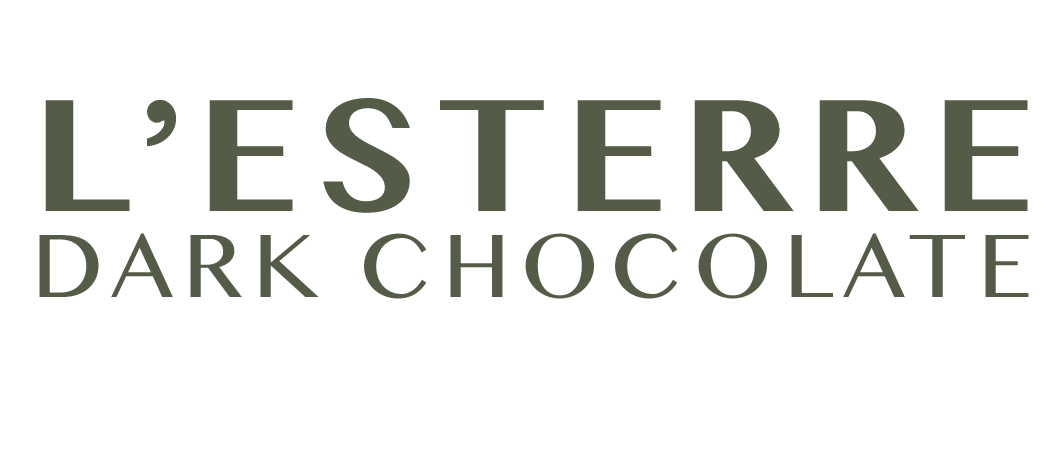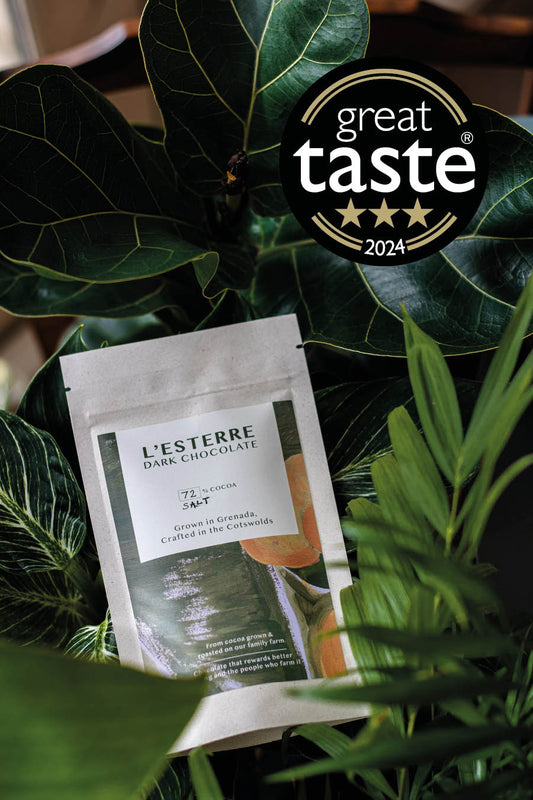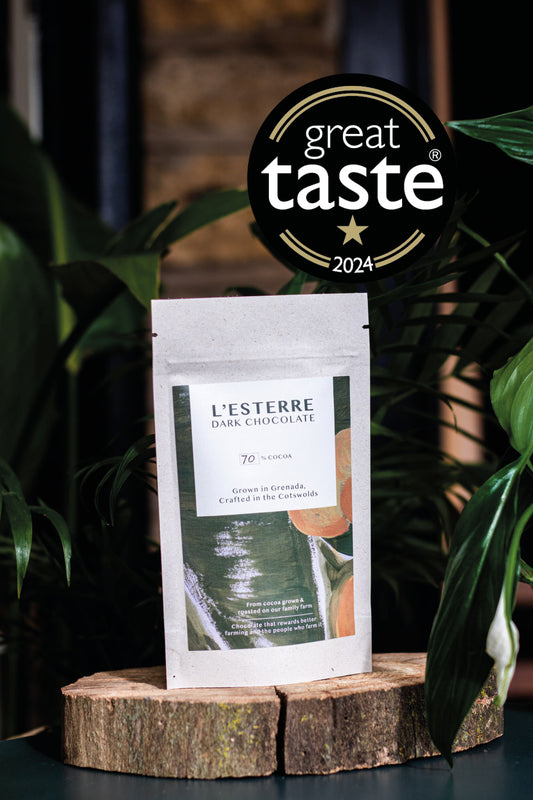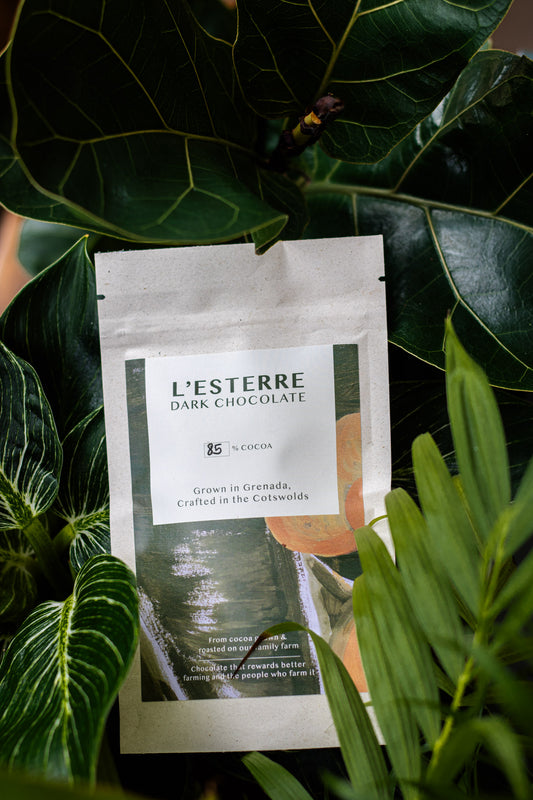
For those of you who may not know me, my name is Bobbie. I am a 4th generation nutmeg & cocoa farmer.
This is my story. This is my love letter to my fellow islanders. This is my hope for our future.
My base reality.
Growing up in Grenada, I was blissfully unaware of what we’re blessed with here. Every Sunday, my parents, sisters and I would go to visit our family estate in the country, L’Esterre, for lunch with my grandmother, aunts, uncles and cousins. Seventy acres of biodiverse flora and fauna—our family’s nutmeg and cocoa estate.
And I dreaded it.
The windy journey through the rainforest. It was hot, clammy. Sandflies for days. Guaranteed car sickness. Sweating through my socks that were tucked into my jeans. The cocoa stank. The ground was always muddy. It was so uncomfortable.
This is how I viewed my visits to L’Esterre growing up: totally ignorant. Totally unappreciative.
It bore no resemblance to the farms I’d seen on TV or in books growing up; all the neat rows, singular crops and tractors. I was conditioned to thinking the way we were growing was messy.
Messy.
What I didn’t realise at the time was that all this messiness was regenerative agriculture at work. A way of growing that echoes nature’s mechanisms. And nature knows best, right?
Ironically, now my life’s work is to ensure this beautiful messiness continues.

Grenada’s Gold.
Look, we live on this island. And on it sits gold.
We are living on gold.
Other countries don’t have what we have. Not Ukraine, not Morocco or the Maldives. Certainly not Barbados, or even Trinidad and Tobago.
We have the best soil in the world. In the words of my Uncle Ken, ‘you plant a cricket bat, it will grow’. Some magical stuff is happening under our feet and it’s pretty significant.
Our soil is volcanic and fertile. We have a favourable climate with regular rainfall and sunshine. Team that together with a lush tropical rainforest plus the proximity to the sea in all directions; the atlantic and the Caribbean. They all play a role in this resulting unique terrain.
How we grow and what we grow with also impacts this. Somehow we created the conditions for extremely bold flavour and high quality produce. You will find breadfruit friendly neighbours with guavas, nutmegs, mangoes, cinnamon and cloves, surrounding and feeding each other through their nutritious root networks underneath our feet. And we don’t see most of this magic.
Sometimes, we even take it for granted because it’s all we’ve ever known.

The realisation.
See, I only realised this gift we have in Grenada when I moved away from it.
It was conversations with particular individuals at certain points throughout my life that made me realise this. I’d mention in throwaway side remarks about L’Esterre. People thought I was nuts not to be living worlds away in a big city.
At the time, I was so desperately trying to carve my own path away from home. To forge a new story. Not realising the true significance and unique standpoint of the story that was waiting for me back home.
The more places I visited around the world.
The more people I met.
The more research I did.
The more books I read.
The more I learnt about agriculture. Farming systems. Climate change. Human beings.
I knew where I had to be.
And the pandemic made sure of that. I paused. We all paused. Trying to search for a reason for all of this happening. Everything needs a reason.
We were told to stay home. That’s when I discovered my home.

But what I discovered at L’Esterre was not just what we were growing. But how we were growing it, and how what we’re doing here plays a key role in a wide global significance.
For solving climate change.
For feeding the world sustainably.
For producing high quality, nutritious food that makes people’s imagination run wild.
So I did my research; I learnt my trade. I reached out to everyone and anyone doing good in the industry. I learnt from uncle the magic of regenerative systems at work, that had been at work for over 4 generations.
We’ve been growing this for generations and the world is only waking up to this.

My vision for Grenada.
Full disclosure, I haven’t been in the farming world for long. It was only fairly recently that I discovered the importance of good growing. And how important spices are also because they represent Grenada.
Look, I don’t need to bore you with the stats and science behind climate change. It’s happening, we’re aware of it. The beauty of it is that there’s actually a solution to all of this mess we’re in.
And it’s in regenerative agriculture. And we’re already doing it. And we have been for a very long time. And the spices and cocoa we grow here play a pivotal role in this.
So let’s shout about it. Let’s grow more of them.
I know some of you may be thinking how can a tiny island in the Caribbean make much of a difference on a global stage?
Local action. Global impact.
When we look after Grenada, we look after the world.
We just need to tell our story better.

Here’s what I envision. Grenada as:
-
The first island to be completely organic. To ban imports of pesticides and synthetic fertilisers. It’s already happening in countries around the world, let’s beat them to it.
-
The first island to grow regeneratively. That messiness I was alluding to earlier, we need more of that.
-
The first island to be self-sufficient in our food and water supply.
-
The first truly circular island economy.
My ambition for Grenada may be big. But it’s necessary.
And I know I can’t single handedly do all these things.
So where do spices and cocoa fit into this?
They fit beautifully into the regenerative agricultural model and play nicely into tourism. People go nuts for spices and chocolate; they want to see where it comes from, how it’s grown and it’s environmental and social impact.
We just need to make people want to farm them more.
So I propose:
-
Make farming prosperous. By putting the financial reward behind growing well, and connecting to customers who care as much about your product as you do; in its flavour, quality and how it’s grown. This will make farming function like a business again so it can continue to grow.
-
Make farming glamorous. This will come through the marketing, photos, branding, story telling, social media communication. Agritourism; living a farmer’s life.
In Grenada, we need small agri-businesses to grow. We need to give them the right conditions to grow their own supply chain and capture more value in it.
-
Through access to a community of like-minded individuals.
-
Through access to capital to transform their raw product into a value-added one.
-
Through access to knowledge and education so they can continue to grow.

By doing this, we’ll remove the global stigma that comes with farming. That it’s a backward, lowly vocation that only peasants do. Working in agriculture can be aspirational.
Now I know I can say all these grand sweeping statements. But we need to back it up with action.
It’s easy to feel helpless and ignore the situation we’re in. That’s the easy way out.That’s the comfortable way out. The pandemic made us uncomfortable.
It made us question everything it meant to be a human being on this earth. It made us re-evaluate the way we’re treating our world and those around us. I hope this is our wake up call. To learn our lesson. To work with our world. With nature. In better and exciting ways.
We can not wait for others to make things happen for us to change. We can be ahead of our time. We need to change things ourselves, and radically so.
The way forward?
We work together. When people come together for a cause greater than themselves, magical things happen.
Let us pave a path forward in an agricultural revolution. Let us be the first. Let our island be an example of a better way. So let’s make a plan. Let’s live up to our name.
The Isle of Spice.



